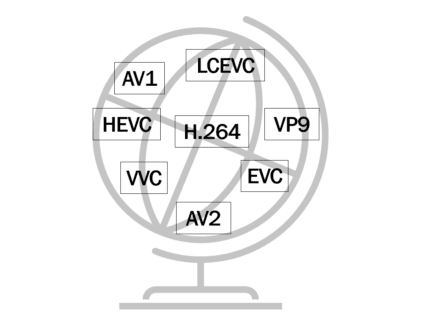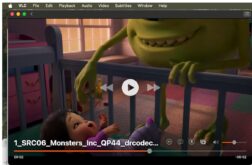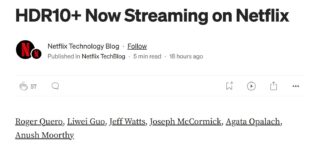Here are some of the most popular codec-related articles that I’ve written lately for this site, Streaming Media Magazine, and some other outlets.
Contents
General
The Streaming Codec Landscape in 2021 – (January 2021) By any measure, 2020 was a hectic year for video codecs or the compression technologies that drive streaming video. This year saw the launch of two standards-based codecs (with another due soon) from the Moving Pictures Experts Group (MPEG), the first hardware support for the Alliance for Open Media’s AV1 codec, and continued deployment of HEVC/H.265. In this article, I’ll provide a status update for streaming codecs, discuss the new MPEG codecs, identify factors that will control their adoption, and make some predictions regarding 2021 and beyond.
How to predict codec success – (December 2020) – With six new codecs to consider by the end of 2021, it’s worth reviewing factors that contribute to a codec’s successful adoption. In this article, I’ll review those factors using H.264 and HEVC, and create an analysis framework I’ll use in future articles to handicap the potential success for AV1 and the three new MPEG codecs.
MPEG: What Happened? – (July 2020) – Since its establishment by Leonardo Chiariglione and Hiroshi Yasuda (from Nippon Telegraph and Telephone) in 1988, the Moving Pictures Experts Group (MPEG) has made an indelible mark on the transition from analog to digital video. On June 6, 2020, a message on Chiariglione’s MPEG site announced that MPEG is “closed.” A little digging revealed that while Chiariglione had, in fact, separated from MPEG, MPEG was in fact not closed, though it was significantly reorganized. Still, if there was a Mount Rushmore for those who contributed to the success of digital video, Chiariglione would clearly have a bust, making his parting with MPEG significant enough to memorialize.
Inside MPEG’s Ambitious Plan to Launch 3 Video Codecs in 2020 – (October 2019) – In 2020, the Moving Pictures Expert Group (MPEG) plans to launch three different codecs. To put that in perspective, there was a nine-year gap between MPEG-2 (1994) and H.264 (2003), and a ten-year gap between H.264 and HEVC (2013). By any measure, the good people at MPEG have been very, very, busy. The three codecs are Versatile Video Coding (VVC), Essential Video Coding (EVC), and Low Complexity Enhancement Video Coding (LCEVC). Before digging into the details, let’s discuss what’s driving this accelerated pace of innovation.
HEVC, AV1, VVC: How to Make Sense of 2019’s World of Codecs – This article discusses the current status of HEVC, AV1, and Versatile Video Coding (VVC), essentially reviewing the last 12 months of progress for each. You’ll learn where each codec is from a development standpoint, where it plays, how long it takes to encode, what it costs, and how the encoding quality compares.
VVC
How to predict VVC (Versatile Video Coding) market performance – (December 2020) Today I focus narrowly on Versatile Video Coding (VVC) and it’s potential for commercial success. For additional background, take a look at my article, How to predict codec success–I identified nine questions that reveal the critical factors that will largely dictate if and when a codec will achieve commercial success. With that in mind, I’ll apply those questions to Versatile Video Coding (VVC), a standard-based codec that was finalized in July. I suggest that you at least scan the codec success article before reading this one.
How Does VVC Measure Up Right Now? – For this review, I took a first look at VVC (Versatile Video Coding). Specifically, I compared Fraunhofer HHI’s implementation of the VVC codec (Versatile Video Encoder; VVenC) against the Alliance for Open Media’s (AOMedia) aomenc codec and the x.264 and x.265 codecs in FFmpeg. I found VVenC to be simple to use and much faster than expected. Its output quality was the best in the review.
Catching Up with VVC – (October 2020) VVC is one of the three codecs to be launched by MPEG in 2020. I wrote about VVC extensively here (business side) and here (technical side), and wanted to provide some quick updates. By way of background, codecs have two sides, the performance side, and the business side. In this short article, I’ll address both.
How to Think About VVC – (July 2020) Streaming Media article catching up on the licensing and performance of VVC.
What Is VVC? – Overview article from November 2019.
Impressive Early Results for Versatile Video Coding (VVC) – MPEG is working on a new coding standard called Versatile Video Coding (VVC). A colleague recently sent me a presentation from Thierry Fautier, VP Video Strategy at Harmonic, which contained some preliminary encoding results to be formally presented at a paper given at IBC. The presentation was from a short talk Thierry gave at the Mile High Video 2018 conference.
LCEVC
I Analyzed LCEVC with V-Nova and the Results Were Impressive – (July 2020) Just a quick note to let you know that I’ve published a comprehensive report that documents the testing, quality, and performance of the Low Complexity Enhanced Video Codec (LCEVC) as developed by V-Nova and in the process of becoming standardized by MPEG. By way of background, I’ve been consulting with V-Nova to test LCEVC using a range of test files and test conditions. Here are the results.
AV1
https://www.streamingmedia.com/Articles/Editorial/Featured-Articles/AV1-Has-Arrived-Comparing-Codecs-from-AOMedia-Visionular-and-Intel-Netflix-142941.aspx – My focus for the review was developer-level products for integration into an existing encoding workflow as opposed to commercial cloud encoding or standalone encoders. I tested four separate AV1 encoders: AOMedia’s standalone aomenc, v 2.0.0, Intel/Netflix’s SVT-AV1 codec, v 0.8.4 confirmed with version 0.804-22, Visionular’s Aurora1 codec, v 2.0.1, libaom, the AOMedia codec in FFmpeg, v 2.0.0.
AV1 encoding on Windows is now only 2x slower than x265 – (July 2020) With a properly compiled version of FFmpeg, encoding performance is slightly faster than the Alliance for Open Media’s encoder, though output quality is very slightly lower. Congrats to AOM for delivering on their promise to get encoding times down. Thanks for all the help I got from multiple sources, including Google, Visionular, Intel, Sébastien Faure, and others who wish to remain nameless, for improving the accuracy of my recent AV1-related research, which will appear in a future article in Streaming Media Magazine.
AV1 Turns 2.0 – (May 2020) – Just a quick announcement that the Alliance for Open Media has launched version 2.0 of the AOMedia AV1 encoder. According to the Phoronix website, from which I grabbed this news, “Libaom 2.0 is the first release since the original 1.0 release back in mid-2018 after the AOMedia codec working group approved the 1.0 release. The developers view this AOMedia AV1 2.0 release as now being their “first official release” for production. Libaom 2.0 adds a real-time encoding mode, SVC support, drops multi-resolution encoding, documentation updates, and other improvements to this open-source AV1 reference encoder.”
 Streaming Learning Center Where Streaming Professionals Learn to Excel
Streaming Learning Center Where Streaming Professionals Learn to Excel










